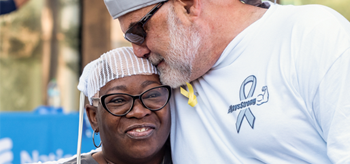Seminal workshop hosts brain tumor patient advocates, leading neuro-oncologists, biopharmaceutical industry representatives, FDA, and NCI to advance strategies for establishing better pathways for therapy evaluation

Leaders from key cross-sections of the neuro-oncology community came together at a recent Brain Tumor Clinical Trial Endpoints Workshop to confront a critical challenge in developing and testing treatments for one of the most deadly forms of cancer – glioblastoma multiforme (GBM), the most common primary malignant brain tumor. Aided by robust conversation and debate, the community was able to adjourn the Workshop with the constructs of a specific action plan to ultimately bring greater clarity to one of the central tasks of clinical trials, establishing the effectiveness of therapies.
Hosted by the Jumpstarting Brain Tumor Drug Development Coalition (Accelerate Brain Cancer Cure, Musella Foundation for Brain Tumor Research & Information, National Brain Tumor Society, and the Society for Neuro-Oncology), experts representing the U.S. Food and Drug Administration (FDA), the National Cancer Institute (NCI), medical imaging companies, contract research organizations, leading biopharmaceutical companies, and medical academic research organizations, addressed how to overcome variables in medical imaging, which currently hinder the ability to accurately assess brain tumor response to investigational therapies, thus slowing drug development for this vulnerable patient population.
“Historically, variability and lack of standardization in the criteria for the use of imaging endpoints to determine tumor response to treatment has impeded efforts to accelerate the evaluation and approval process of new brain cancer therapies,” said Dr. W.K. Alfred Yung, Workshop chair, and chair of the department of neuro-oncology at MD Anderson Cancer Center, “What we did with this Workshop, and what the guidance the FDA graciously provided enables, is to speed the development of standards and tumor response criteria, so that together we can accurately assess the effectiveness of promising therapies seeking approval.”
The Workshop featured presentations and panel discussions, as well as facilitated audience-panel deliberations on topics such as: current brain tumor imaging protocols in multicenter trials; emerging techniques and technologies in brain tumor imaging; and the use of imaging measurements of tumor progression and tumor response in clinical trials. From these conversations, a final group discussion drove the creation of an action plan for the community to follow in order to improve the accuracy and consistency of imaging data, and to launch a coordinated effort to accelerate brain tumor therapy approvals using imaging as a criteria, including:
- Refine and standardize aspects of the Response Assessment in Neuro-Oncology (RANO) criteria, which is a leading method of evaluating brain tumor response to therapy. This includes refinement of RANO’s components, which ultimately can codify its role as the sole criteria used to control variability, and ensure accuracy and consistency in brain tumor clinical trials.
- Establish standards and techniques across the brain tumor imaging field so that accurate data about response to therapies can be gathered, analyzed, managed, and shared across institutions and medical centers in order to ensure the reproducible data needed for registration trials.
Finally, the community also agreed that new and emerging technology, tools, and techniques should continually be evaluated for their ability to further improve imaging accuracy.
“This was an unresolved issue facing the community,” said N. Paul TonThat, CEO, National Brain Tumor Society. “All the key stakeholders were aware of the current limitations and lack of clarity in brain tumor imaging endpoints, but we needed to get all of the leaders into one room to actually begin moving the conversation forward. As a patient advocacy organization and Coalition member, the National Brain Tumor Society was uniquely positioned to work across the many facets of brain tumor drug development and do just that. We thank all of the parties that participated in this important Workshop, particularly the FDA for offering their leadership and guidance, which will undoubtedly benefit industry, researchers and most importantly, the patients.”
We believe if these actions can be accomplished, Industry will be well positioned to pursue brain tumor registration trials that use imaging endpoints (i.e. Response Rate) in single-arm trials as the basis for gaining accelerated or conditional approval of treatments. The prospect of more accelerated approvals not only speeds the time to market for new brain tumor therapies, but may also entice more pharmaceutical companies to invest in this area of research.
“The FDA wants to foster the development of new and effective treatments for patients with brain tumors,” said Dr. Richard Pazdur from the US Food and Drug Administration’s Office of Hematology and Oncology Products. “We are happy to participate in conversations with the neuro-oncology community to discuss the evaluation process for brain tumor therapies.”
The Jumpstarting Brain Tumor Drug Development Coalition will work collaboratively with the biopharmaceutical companies, medical academics, medical technology industry, NCI, and FDA to advance the agenda set forth at the first Brain Tumor Clinical Trial Endpoints Workshop.
About the Jumpstarting Brain Tumor Drug Development Coalition
The Jumpstarting Brain Tumor Drug Development Coalition is made up of four of the leading brain tumor-focused organizations in the United States, encompassing venture philanthropy; patient advocacy; public policy advocacy; research funding and advancement; education; and representing thousands of patients, caregivers, survivors, clinicians, and researchers. The Coalition aims to achieve the most favorable clinical trials process possible for advancing new treatments for brain tumor patients. Learn more.


